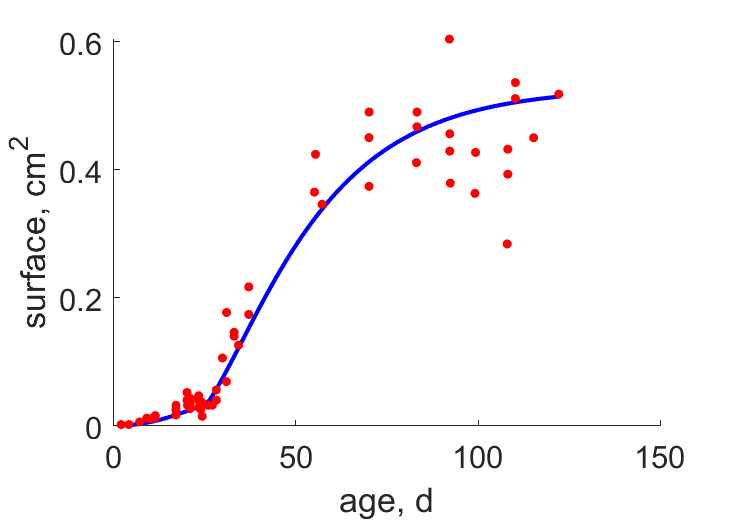Predictions & Data for this entry
| Model: std | climate: A, B | migrate: | phylum: |
| COMPLETE = 2.8 | ecozone: TPi, TA | food: biTim, biCim | class: |
| MRE = 0.084 | habitat: 0iFm | gender: Hsm | order: |
| SMSE = 0.016 | embryo: Fs | reprod: O | family: |
Zero-variate data
| Data | Observed | Predicted | (RE) | Unit | Description | Reference |
|---|---|---|---|---|---|---|
| ah | 2 | 1.997 | (0.001266) | d | age at hatch | GoveBain2003 |
| ab | 27 | 25.74 | (0.04665) | d | age at birth | GoveBain2003 |
| tp | 107 | 107.6 | (0.005829) | d | time since birth at puberty | GoveBain2003 |
| am | 152.5 | 153.2 | (0.004697) | d | life span | GoveBain2003 |
| L2b | 0.045 | 0.03523 | (0.2172) | cm^2 | surface at birth | GoveBain2003 |
| L2p | 0.477 | 0.5202 | (0.09063) | cm^2 | surface at puberty | GoveBain2003 |
| L2i | 0.479 | 0.5279 | (0.102) | cm^2 | ultimate surface | GoveBain2003 |
| Wwb | 0.0012 | 0.001434 | (0.1946) | g | wet weight at birth | GoveBain2003 |
| Wwp | 0.089 | 0.08135 | (0.08591) | g | wet weight at puberty | GoveBain2003 |
| Wwi | 0.091 | 0.08315 | (0.08621) | g | ultimate wet weight | GoveBain2003 |
| Ri | 0.4286 | 0.429 | (0.001083) | #/d | maximum reprod rate | GoveBain2003 |
Uni- and bivariate data
| Data | Figure | Independent variable | Dependent variable | (RE) | Reference |
|---|---|---|---|---|---|
| tL2 |  | age | surface | (0.1669) | GoveBain2003 |
Pseudo-data at Tref = 20°C
| Data | Generalised animal | Barbronia weberi | Unit | Description |
|---|---|---|---|---|
| v | 0.02 | 0.02332 | cm/d | energy conductance |
| kap | 0.8 | 0.6397 | - | allocation fraction to soma |
| kap_R | 0.95 | 0.95 | - | reproduction efficiency |
| p_M | 18 | 4050 | J/d.cm^3 | vol-spec som maint |
| k_J | 0.002 | 0.002 | 1/d | maturity maint rate coefficient |
| kap_G | 0.8 | 0.7992 | - | growth efficiency |
Discussion
- Energy conductance seems to make a jump upwards at birth, which is taken into account
Bibliography